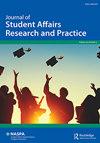NMT逆转神经退行性疾病的机制综述
IF 0.8
Q3 EDUCATION & EDUCATIONAL RESEARCH
Journal of Student Affairs Research and Practice
Pub Date : 2023-05-31
DOI:10.47611/jsrhs.v12i2.4222
引用次数: 0
摘要
本文综述了有关音乐治疗提高神经退行性疾病患者生活质量机制的文献。音乐疗法是一种通过音乐来帮助改善健康的治疗方法。某些专业治疗师将神经音乐疗法(NMT)作为一种联合健康专业,为住院患者提供循证护理,不仅作为安慰的来源,而且作为治疗的来源。对于患有神经退行性疾病,如阿尔茨海默病、帕金森病和表达性失语症的患者尤其如此。目前,越来越多的研究人员正在研究音乐疗法对记忆、语言、运动控制和行为的影响。然而,许多问题仍未得到解答。在这篇综述文章中,我们收集了主要文献来评估音乐疗法的使用和导致成功结果的机制。音乐疗法很重要,因为它提供了一种方法来增强患病患者的舒适度,无论是在住院状态还是在日常生活中。在患有神经退行性疾病的患者中,音乐可以增加大脑区域的可塑性,从而改善语言、记忆、行为等。随着我们更好地了解其机制并优化音乐疗法,它可能会为患者提供更多的便利,甚至在未来治疗和治愈某些疾病。本文章由计算机程序翻译,如有差异,请以英文原文为准。
A Comprehensive Review of the Mechanisms of NMT For Reversing Neurodegenerative Disorders
This paper reviews the literature concerning the mechanisms of music therapy that improve the quality of life for patients with neurodegenerative diseases. Music therapy is a remedial practice involving music to help improve health. Certain professional therapists practice Neurologic Music Therapy (NMT) as an allied health profession that provides evidence-based care to hospitalized patients, not just as a source of comfort, but also as a source of healing. This is especially the case for patients with neurodegenerative disorders such as Alzheimer's disease, Parkinson’s disease, and expressive aphasia. The current growing body of researchers is investigating the effects of music therapy on memory, speech, motor control, and behavior. However, various questions remain unanswered. In this review paper, we gathered primary literature to evaluate the use of music therapy and the mechanisms that lead to successful outcomes. Music therapy is important because it provides a way to enhance comfort for diseased patients, whether in a hospitalized state or an average daily scenario. In patients with neurodegenerative diseases, music increases plasticity in areas of the brain that may improve speech, memory, behavior, and more. As we better understand the mechanisms and optimize music therapy, it may provide more ease to patients and even treat and cure certain disorders in the future.
求助全文
通过发布文献求助,成功后即可免费获取论文全文。
去求助
来源期刊

Journal of Student Affairs Research and Practice
EDUCATION & EDUCATIONAL RESEARCH-
CiteScore
2.40
自引率
9.10%
发文量
50
期刊介绍:
The vision of the Journal of Student Affairs Research and Practice (JSARP) is to publish the most rigorous, relevant, and well-respected research and practice making a difference in student affairs practice. JSARP especially encourages manuscripts that are unconventional in nature and that engage in methodological and epistemological extensions that transcend the boundaries of traditional research inquiries.
 求助内容:
求助内容: 应助结果提醒方式:
应助结果提醒方式:


